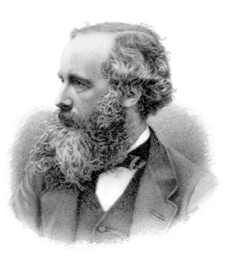User:Cactus.man/Sandbox/P-Sco/Selected biographies
| Main Page | Selected articles | Selected biographies | Selected quotes | Selected pictures | Featured Content | Categories & Topics |
Selected biographies 1
User:Cactus.man/Sandbox/P-Sco/Selected biographies/1

James Clerk Maxwell FRS FRSE (13 June 1831 – 5 November 1879) was a Scottish physicist and mathematician who was responsible for the classical theory of electromagnetic radiation, which was the first theory to describe electricity, magnetism and light as different manifestations of the same phenomenon. Maxwell's equations for electromagnetism have been called the "second great unification in physics", where the first one had been realised by Isaac Newton.
With the publication of "A Dynamical Theory of the Electromagnetic Field" in 1865, Maxwell demonstrated that electric and magnetic fields travel through space as waves moving at the speed of light. He proposed that light is an undulation in the same medium that is the cause of electric and magnetic phenomena. The unification of light and electrical phenomena led to his prediction of the existence of radio waves. Maxwell is also regarded as a founder of the modern field of electrical engineering.
Maxwell was the first to derive the Maxwell–Boltzmann distribution, a statistical means of describing aspects of the kinetic theory of gases, which he worked on sporadically throughout his career. He is also known for presenting the first durable colour photograph in 1861 and for his foundational work on analysing the rigidity of rod-and-joint frameworks (trusses) like those in many bridges. He is responsible for modern dimensional analysis. Maxwell is also recognized for laying the groundwork for chaos theory. (Full article...) Read more ...
Selected biographies 2
User:Cactus.man/Sandbox/P-Sco/Selected biographies/2

David Hume (/hjuːm/; born David Home; 7 May 1711 – 25 August 1776) was a Scottish philosopher, historian, economist, and essayist who was best known for his highly influential system of empiricism, philosophical scepticism and metaphysical naturalism. Beginning with A Treatise of Human Nature (1739–40), Hume strove to create a naturalistic science of man that examined the psychological basis of human nature. Hume followed John Locke in rejecting the existence of innate ideas, concluding that all human knowledge derives solely from experience. This places him with Francis Bacon, Thomas Hobbes, John Locke, and George Berkeley as an empiricist.
Hume argued that inductive reasoning and belief in causality cannot be justified rationally; instead, they result from custom and mental habit. We never actually perceive that one event causes another but only experience the "constant conjunction" of events. This problem of induction means that to draw any causal inferences from past experience, it is necessary to presuppose that the future will resemble the past; this metaphysical presupposition cannot itself be grounded in prior experience. (Full article...) Read more ...
Selected biographies 3
User:Cactus.man/Sandbox/P-Sco/Selected biographies/3

Anne (6 February 1665 – 1 August 1714) was Queen of England, Scotland, and Ireland from 8 March 1702, and Queen of Great Britain and Ireland following the ratification of the Acts of Union 1707 merging the kingdoms of Scotland and England, until her death in 1714.
Anne was born during the reign of her uncle King Charles II. Her father was Charles's younger brother and heir presumptive, James, whose suspected Roman Catholicism was unpopular in England. On Charles's instructions, Anne and her elder sister Mary were raised as Anglicans. Mary married their Dutch Protestant cousin, William III of Orange, in 1677, and Anne married the Lutheran Prince George of Denmark in 1683. On Charles's death in 1685, James succeeded to the throne, but just three years later he was deposed in the Glorious Revolution of 1688. Mary and William became joint monarchs. Although the sisters had been close, disagreements over Anne's finances, status, and choice of acquaintances arose shortly after Mary's accession and they became estranged. William and Mary had no children. After Mary's death in 1694, William reigned alone until his own death in 1702, when Anne succeeded him. (Full article...) Read more ...
